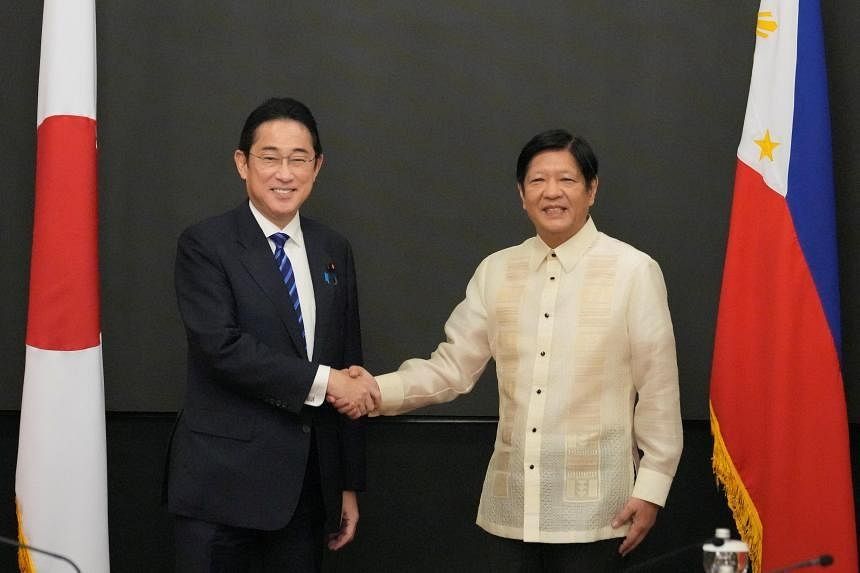Japan and the Philippines have fortified their military alliance, as both nations seek to resist a more aggressive Beijing in the East and South China Seas.
Standing beside President Ferdinand Marcos Jr in Manila on Friday night, Japanese Prime Minister Fumio Kishida said his country will begin formal talks to forge a reciprocal access agreement (RAA) that would allow both nations to hold joint military drills for the first time on Philippine shores.
Japan is also giving the Philippine Navy a 600 million yen (S$5.4 million) grant for a coastal radar system to bolster its maritime domain awareness capabilities.
Neither Mr Kishida nor Mr Marcos explicitly mentioned China during their joint press conference, but their message was clear.
“We share serious concerns about the situation in the East China Sea and the South China Sea. And that attempt to unilaterally change the status quo by force is unacceptable,” said Mr Kishida, minutes after announcing Japan’s latest official security assistance (OSA) to the Philippines.
His two-day visit to Manila came after weeks of tense encounters between Philippine and Chinese military and coast guard forces in the South China Sea, where Manila and Beijing have competing claims.
Japan has no claim over these waters, but it has a separate territorial dispute with Beijing over the East China Sea. Both the Philippines and Japan are located near Taiwan, the self-ruled democratic island that Beijing considers part of China.
If the RAA is finalised, it would allow Japan to deploy troops, enter military bases and bring equipment to the Philippines, a level of access that the United States currently enjoys through its own visiting forces agreement with Manila.
Mr Marcos said the Philippines stands to gain much once the RAA with Japan is ratified.
“We are cognisant of the benefits of having this arrangement, both to our defence and military personnel, and to maintaining peace and stability in our region,” he said.
The Philippines’ geographical location makes it a strategic military ally for superpowers Japan and the US in the event of a Taiwan-China conflict, or an armed attack by Beijing in the East and South China Seas.
China’s growing influence in the Indo-Pacific region has been pushing the US, Japan and the Philippines towards trilateral security cooperation.
The three nations have repeatedly called out Beijing’s aggressive behaviour in the disputed waters, and their coast guard forces conducted joint drills for the first time in the South China Sea in June.
In their joint statement, Mr Kishida and Mr Marcos agreed to further strengthen their trilateral cooperation with the US, but did not elaborate.
The Philippines moving closer to Japan came as no surprise to geopolitical analyst Dindo Manhit, president of Manila-based think-tank Stratbase ADR Institute.
He said Japan has been consistently helpful to the Philippines in terms of aiding development projects and boosting civil maritime capabilities.
Through its benevolent overseas development assistance, Japan has provided 12 patrol vessels to the Philippine Coast Guard in the past two decades.
These include the 97m-long BRP Teresa Magbanua, one of Manila’s largest vessels patrolling the South China Sea. Mr Kishida toured the vessel on Saturday before returning to Tokyo.
“We have seen Filipinos being hired by Japanese companies. They help us create jobs and economic growth. They help us in different areas like infrastructure, investments, civil maritime investments,” said Mr Manhit.
“So I think it’s now the right time to elevate this partnership to the next level through a stronger security cooperation.”
He added that Filipinos’ public sentiment towards Tokyo has warmed up over the decades since Japanese troops invaded Manila during World War II.
Defence analyst Don McLain Gill, a lecturer at De La Salle University in Manila, said Japan’s broadening partnership with the Philippines also reflects its foreign policy strategy of providing military aid to like-minded countries in the Indo-Pacific.
“Tokyo has (transformed) this challenge into an opportunity to demonstrate its commitment to playing a larger role as a security partner to like-minded states,” he said.
In particular, Japan seeks partners to help “preserve the established order that banks on international law at a time when revisionist forces are seeking to alter the security architecture in line with their narrowly driven ambitions”, he added.
Apart from the OSA, Japan and the Philippines also inked deals covering cooperation in areas such as disaster response, infrastructure, tourism and trade.
The Philippines rolled out the red carpet for Mr Kishida. Mr Marcos hosted a state banquet for the Japanese leader after their bilateral meeting at the presidential palace. The two leaders then watched a grand fireworks show overlooking the Pasig River.
The Senate and House of Representatives also held a joint special session on Saturday morning for Mr Kishida, making him the first Japanese leader to address the Philippine Congress.
“Japan and the Philippines are now experiencing an excellent relationship – we call it the golden age,” Mr Kishida said at the state banquet.
“I look forward to working with President Marcos to take these bilateral relations to even newer heights.” – The Straits Times/ANN

